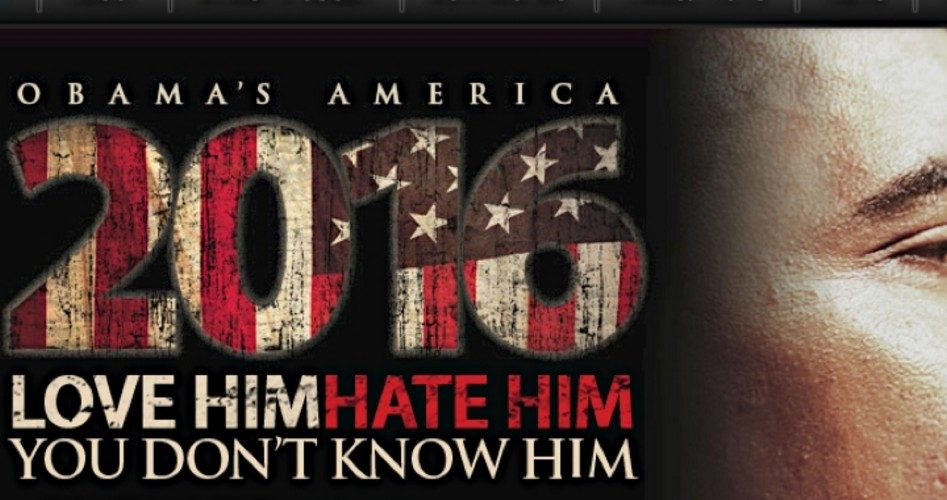
2016: Obama’s America, an anti-President Obama documentary, finished at number eight in the box office this past weekend. Its strong anti-socialist message and emphasis on American patriotism, as well as its unabashed criticism of President Obama, propelled it to the top 10 position, surpassing the Open Roads film comedy Hit and Run and the Warner Bros. horror film The Apparition.
The film was distributed by Rocky Mountain Pictures, which has released several conservative films in recent years, including An Inconsistent Truth, which rebutted a number of Al Gore’s assertions found in An Inconvenient Truth, and Expelled: No Intelligence Allowed.
CNS News reports on 2016: Obama’s America, “The documentary is a conservative critique of what the country would look like four years from now if President Barack Obama is re-elected.” But the documentary does more than that. It outlines the roots of President Obama’s radical ideologies. It is based on Dinesh D’Souza’s books, The Roots of Obama’s Rage and Obama’s America. In fact, D’Souza helped co-direct the film with John Sullivan.
“What’s happening is that people are really hungry for new information about Obama. There really is this sense that he remains an elusive figure,” D’Souza said. “Then there’s a second sense that the American dream is in the balance, the American dream is at stake, and that gives people a sense of anxiety about where the country is going.”
Originally intended for limited release, the documentary was expanded into a nationwide release and earned $6.2 million, finishing at number 8, an impressive jump from number 13 in its seventh weekend in release. It opened in theaters in the middle of July, and as a result of its strong showing in the box offices, was expanded into over 1,000 theaters across the country, “leading all other wide releases with an average of $5,717 a cinema,” observes CNS.
According to D’Souza, the film will continue to expand to more theaters across the country and will likely remain in theaters until early October. It will also likely be followed by a quick DVD release in the time period leading up to the November 6 elections.
“It’s extremely rare for a documentary to break into the top-10, but August can be a land of opportunity for smaller films,” said Paul Dergarabedian, box-office analyst for Hollywood.com. “Also, there’s the fact that this is a very conservative film. Normally, it’s Michael Moore-branded documentaries, the liberal documentaries that make all the money.”
For example, Michael Moore’s critical documentary of George W. Bush, Farenheit 9/11, opened at Number 1 in June 2004 with $23.9 million, and went on to become the top-grossing documentary in history.
D’Souza believes that some of the success of Fahrenheit 9/11 is that conservatives were drawn to the theaters to watch the film out of curiosity, and believes that the same may be in store for Obama’s America.
2016: Obama’s America is certainly intriguing enough to draw crowds from all political ideologies. D’Souza’s books, and this documentary that was modeled after them, make several interesting and significant claims about President Obama, his background, his political ideologies, and the reasons for his political success.
This documentary makes the claim that Obama’s campaigns have largely rested on the race issue in the United States. In particular, D’Souza contends that President Obama used his biracial status to his advantage and relied heavily on the fact that he would be the first black president if elected.
The film also explores President Obama’s relationship with his father, who was both abusive and neglectful toward Obama. Though Obama’s father ultimately abandoned his family, D’Souza asserts that his father’s political views resonated with Barack. In fact, D’Souza argues that Obama’s father installed a hatred toward America in his son.
The documentary explores the influences within Barack Obama’s political sphere, such as Frank Marshall Davis, a communist in Hawaii. Obama’s relationship with Marshall has been documented several times, in fact. Bestselling author Paul Kengor, a professor at Grove City College, wrote a book about Davis entitled, The Communist. Frank Marshall Davis: The Untold Story of Barack Obama’s Mentor. According to Kengor, Davis was a 20th-century American member of the Communist Party USA who wrote pro-Soviet propaganda in newspaper columns. Kengor also asserts that Davis’ writings bear a “haunting similarity to some of Obama’s statements.”
D’Souza’s documentary also explores the influence of Bill Ayers on Obama’s political career. Ayers is infamous for his terrorist endeavors while a member of Weather Underground. In fact, Ayers founded the Weatherman group, and summed up the organization’s ideology as follows: “Kill all the rich people. Break up their cars and apartments. Bring the revolution home, kill your parents.” Ayers’ book Fugitive Days reveals his unrepentant demeanor toward his acts of terrorism against the New York City police headquarters in 1970, the Capitol building in 1971, and the Pentagon in 1972.
2016: Obama’s America outlines the influence of Reverend Jeremiah Wright on Barack Obama’s political ideologies, particularly the influence of Wright’s religious creed, Black Liberation Theology, which takes a Marxist interpretation of the Holy Bible.
The documentary also follows the path the United States has taken since Obama has been elected, and renders a guess as to what the nation would look like four years from now, were Obama to be reelected. 2016: Obama’s America takes a critical look at Obama’s policies that have resulted in increased national debt, Obama’s oil moratoriums, Obama’s destructive energy policies, and his foreign policy.
2016: Obama’s America takes a largely critical view on anti-colonialism and points out that anti-colonialists have left a number of countries in Africa and Latin America at the hands of tyrannical regimes.
Overall, the documentary is a fascinating one, as it covers a great deal of material and seems to move effortlessly from one subject to the next. D’Souza’s patriotism and love of country is evident in the film, though there are also doses of neo-conservatism, particularly as the film deals with foreign policy.




